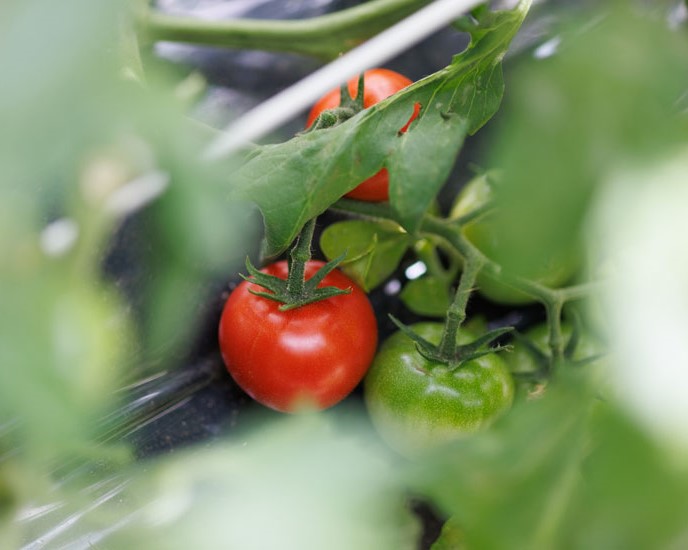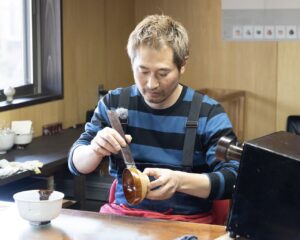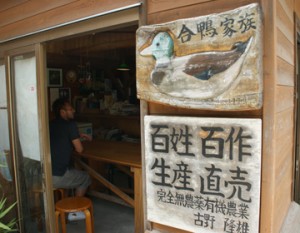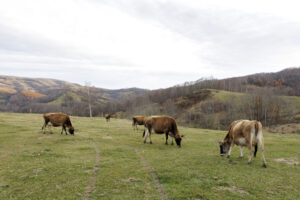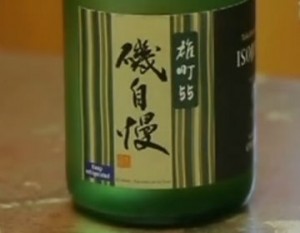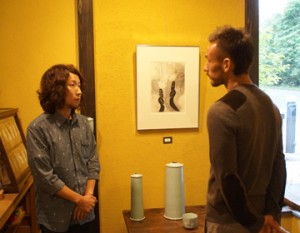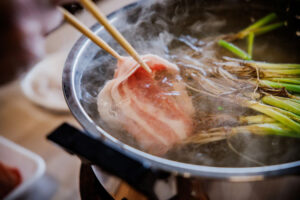Midi tomatoes are sweet, tender, and of moderate size. Ijiri Farm in Yazu-cho, Tottori Prefecture, has been attracting chefs from inside and outside of the prefecture for its excellent balance of acidity and richness. The farm has been practicing healthy tomato cultivation by using the bichemi farming method, which uses local bamboo, and soil preparation that avoids the use of pesticides.
High-sugar tomatoes from Yazu Town, Tottori Prefecture, home of fruit

Yazu Town is located in the southeastern part of Tottori Prefecture. Surrounded by mountains, the town has long been famous for its cultivation of fruit trees, such as Hanagosho persimmons and 20th century pears, and is renowned as a “fruit village. The Hattogawa River flows through the center of the town, creating a beautiful scene with its rural landscape and rows of persimmon trees.
In this rich nature-rich town of Hachigashira, there is a farmer who grows high-sugar midi-tomatoes that have gained such a reputation that chefs from inside and outside of the prefecture visit the farm to inspect them. Mr. Hiroaki Ijiri of Ijiri Farm is one of them.
Midi tomatoes that are sweeter and softer than large tomatoes

Mr. Ijiri grows “midi-tomatoes” (medium-sized tomatoes), which are a cross between mini-tomatoes and large tomatoes. While mini-tomatoes are said to weigh 10 to 30 grams and large tomatoes 100 grams or more, midi-tomatoes weigh 30 to 60 grams and are about the size of a golf ball. Because they are more filling than conventional mini-tomatoes and easier to eat than large tomatoes, they have gained popularity in recent years.
Also, while large tomatoes have a sugar content of 3 to 5 degrees, midi-tomatoes are said to have an average sugar content of 7 to 8 degrees, and their sweetness is one of their characteristics. Some varieties are suitable for fruit tomatoes with sugar content of 9 degrees or higher, and the number of growers seems to be on the rise.
Mr. Ijiri switched from manufacturing to farming.

Mr. Ijiri originally worked for a manufacturing company. When Lehman Brothers collapsed, he became concerned about the future of the manufacturing industry in the prefecture and thought about changing his career to become a farmer, something he had been interested in for a long time. Just then, he came across a program called “Agri-Start Training” offered by the Organization for the Development of Agriculture and Rural Areas, a prefectural organization that trains farmers. Mr. Ijiri participated in the program and visited several fruit, rice, and vegetable farms. After the training period, he rented a glass greenhouse operated by the town and took his first step as a tomato farmer.
Researching cultivation methods suited to the land of Yazu-cho

In Yazu-cho, fruit trees, rice, and white onions were commonly grown, and there were very few institutional tomato farmers. Therefore, even after he started farming, he studied cultivation methods and tomato growing methods suited to Yazu-cho, while acquiring knowledge and skills by visiting tomato farmers in central Tottori Prefecture and other famous tomato farmers. He also greedily adopted the methods implemented by the farmers he visited. As a result, Mr. Ijiri decided to reduce the use of agricultural chemicals in order to produce sweet and fruity tomatoes with less acidity and bitterness.
Normally, when the same crop is grown continuously on the same land, the soil composition becomes unbalanced, leading to poor growth, or “row crop failure. While full-time farmers often use soil disinfectants to balance the soil, Mr. Ijiri has adopted “soil reduction disinfection. In soil reduction disinfection, rice bran or bran (wheat bran) is sprinkled on the soil, which is then filled with water and covered with a plastic sheet to raise the temperature and adjust the soil composition. He is also an Eco-Farmer and uses less pesticides to control pests during tomato cultivation.
He also uses fertilizers such as seaweed and crab shells, which are rich in minerals, instead of chicken or cow manure, because he is told that they improve the taste, sugar content, and longevity of his tomatoes. This is a cultivation method that is only possible in Tottori because of its proximity to the Sea of Japan, and is truly suited to the region.
Soil preparation using local bamboo

In addition to reducing the use of pesticides, Mr. Ijiri is also working on “bichemi farming,” a method of growing safe and secure food using organic materials derived from nature. Just as fallen leaves and dead grass decompose to create nutrient-rich soil in traditional satoyama, the bichemi farming method aims to create rich soil without using agricultural chemicals as much as possible by incorporating energy and organic matter derived from nature.
In recent years, an increasing number of municipalities are taking advantage of the fast-growing nature of bamboo and utilizing bamboo powder made from crushed raw bamboo. The town of Yatsuma also recommends the bichemical farming method as an environmentally friendly way to practice agriculture while managing bamboo groves. Mr. Ijiri also spreads bamboo powder in his fields, which has increased the amount of high-quality bacteria and led to a reduction in the use of agricultural chemicals.
Another method for growing large, high-sugar tomatoes is to reduce the amount of water given to the tomatoes to suppress their growth and make them sweeter, but this results in a hard skin.
However, midi-tomatoes can only grow to the size of medium-sized tomatoes, so they are sweet without water reduction or stress. Ijiri says, “The combination of reduced pesticides, organic fertilizers, and bichemi farming has allowed us to grow them in a healthier way, which has resulted in better taste and higher sugar content.
To the tomatoes that are pulled from the chef.

Mr. Ijiri’s midi tomatoes, which incorporate various farming methods, gradually caught the attention of chefs, who commented that “the balance between acidity and richness and sweetness is excellent” and “sweet tomatoes are often hard, but Mr. Ijiri’s tomatoes are soft and delicious.
One of the turning points in his career was an encounter with Chef Hideki Takayama, who runs the French restaurant “Entre Nou” in Kobe, Hyogo Prefecture. He is one of Japan’s leading French chefs, having twice participated in the “Bocuse d’Or International Culinary Competition,” known as the “Culinary Olympics,” and was the only Asian to win twice in the Asia-Pacific competition.
When Chef Takayama visited Ijiri Farm at the request of the prefectural government, he highly evaluated the taste of Ijiri’s midi tomatoes and decided to use them in his restaurant. From there, the product spread to many chefs and retailers, helping to expand sales channels.
Later in 2018, Ijiri’s tomatoes were also selected for “Dining Out Tottori – YAZU with LEXUS,” an event where chefs from Tottori Prefecture entertain guests with local ingredients. The tomatoes are gradually being sold at various restaurants in and outside of the prefecture, further spreading their name recognition.
A brand like never before.

The brand name and packaging were also redesigned to differentiate the particular midi tomatoes. The brand name was changed to “Hanasakahime,” named after the local god of agriculture, Konohanasakuyahime, who is enshrined at the local “Midori Shrine. An image character for Hanasakahime was also created, resulting in packaging that is unusual for a vegetable.
The company plans to reach out to a wider range of consumers in the future.
We want to deliver tomatoes that taste good no matter who eats them.

The taste of midi tomatoes varies greatly depending on the climate and sunlight of the year. Ijiri’s farm is popular with many chefs, but he says the balance between weather and water management is an issue for the future.
Chefs sometimes tell me that the tomatoes from that season of that year were the best they have ever tasted. Since farming technology is advancing day by day, we are eagerly adopting new farming methods, fertilizers, and machinery so that we can consistently deliver tomatoes that everyone will say are delicious.
Since he is currently unable to respond to some orders, Mr. Ijiri hopes to secure human resources and deliver more midi tomatoes in the future. Ijiri hopes that his “Hanasakahime” midi-tomatoes will continue to attract many customers in the future.



